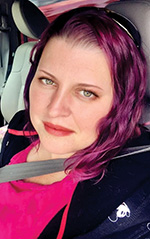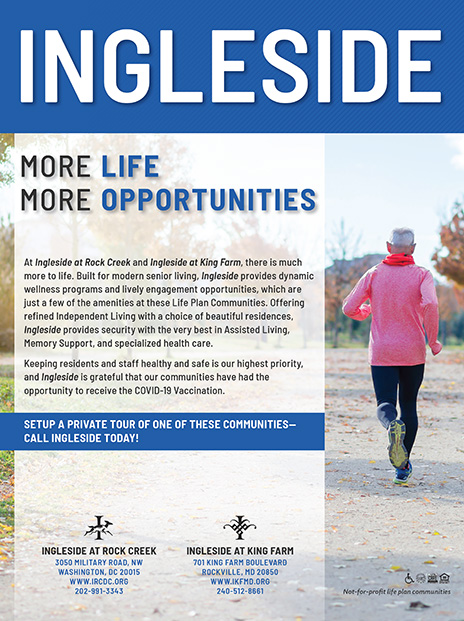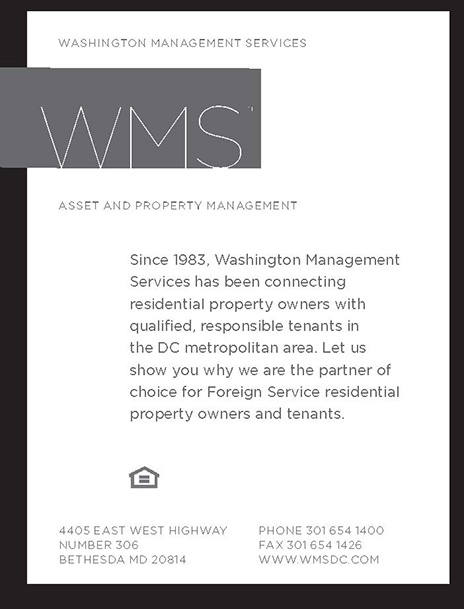My Reintroduction to America—A COVID-19 Journey
Returning “home” after years overseas is notoriously difficult. The COVID-19 pandemic gave the experience a whole new, and surprising, twist.
BY KIMBERLY HARMON
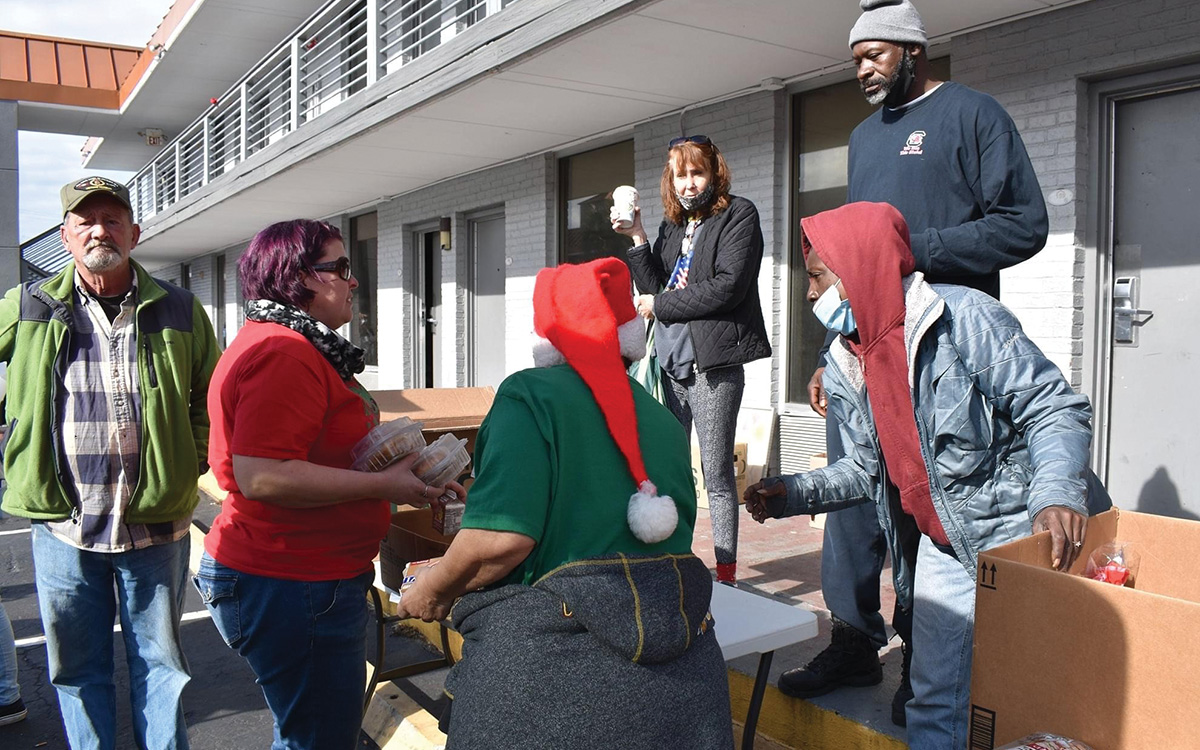
The author, second from left, delivers food to residents at an extended stay hotel in Charleston.
Courtesy of Kim Harmon
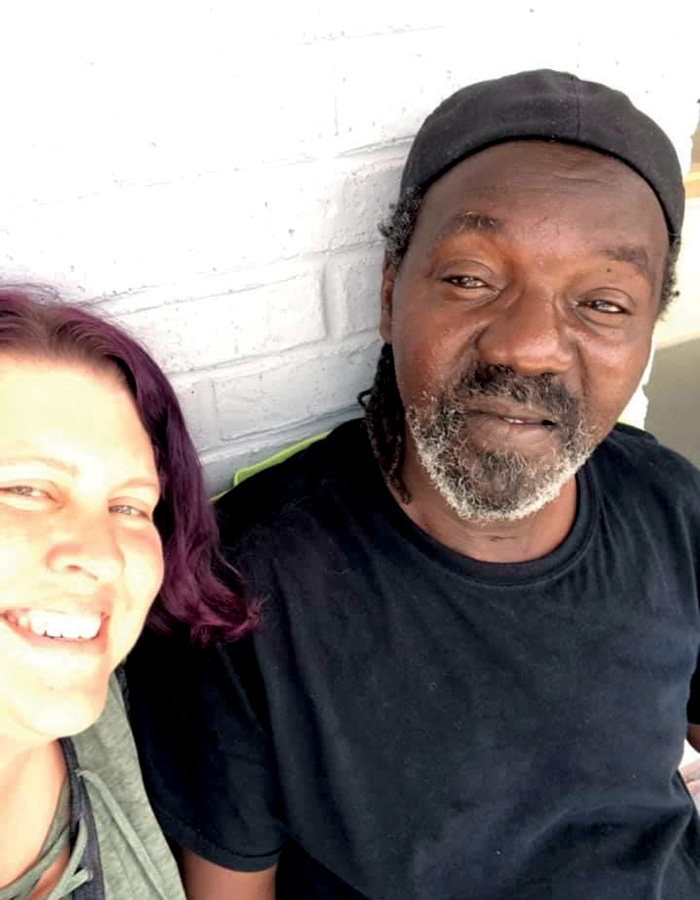
Mr. Henderson “Savannah” Sims, a veteran, talks with the author.
Courtesy of Kim Harmon
After spending nearly eight and a half years overseas as a management officer, I started my first domestic tour in Charleston, South Carolina, with the Bureau of the Comptroller and Global Financial Services in August 2019—just a few months before COVID-19, which had been silently gathering momentum, erupted into public view. The transition back to one’s “homeland,” by itself very difficult after so many years abroad, suddenly became even more challenging—and, as it happened, even more rewarding.
First, the culture shock: There is no one waiting at the airport, no move-in ready, no government housing, no motor pool or social sponsor. But the real clincher is the pay cut. Not only do you lose your overseas allowances, but you have a mortgage, utility bills and car payments, and no embassy community bubble. It’s a bit like being in a foreign country with people that all look and sound like you, but do not want to talk to you. It is harder outside Washington, D.C., because there are only 10 FSOs in Charleston instead of the large Foreign Service support network in the greater D.C. area. Even though I’m a native of South Carolina, it was difficult to find my village.
As I was navigating this new territory—buying and furnishing my first house; learning my new job; trying to meet Americans; joining book clubs, parent-teacher organizations, anything I could think of to reconnect with America—2020 happened.
How It All Began
During the week of March 15, 2020, I noticed an odd post from a woman on one of the Facebook groups I had joined. It seemed like something was off, so I messaged her privately, only to learn that her family—husband and two kids—hadn’t eaten in four days. It was the result of unfortunate circumstances: a lost job, a dead car, no extended family and COVID-19.
I offered to help, and used the Nextdoor neighborhood app to ask for donations of food for the family. Within a matter of days, I had a van full of food and some toys for the children. Someone told me about a church providing free hot meals, so I also picked up meals for the family, plus a few extra. I drove it all to the family at an extended stay hotel on the north side of Charleston. While dropping it off, I saw two older men sitting outside their hotel room and decided to give them the extra meals I had in the car. Then other people asked if I had any more meals.
I realized there was a greater need than I knew, so I quickly returned to the church and asked for 20 more meals. When I returned, the older gentleman to whom I had given the first meal thanked me and told me he hadn’t had food in his hotel room in two weeks. A group used to bring meal vouchers weekly, he said, but when the coronavirus started spreading and restaurants closed, they just stopped coming. “I’ll get food together and be back next Saturday,” I told him. I didn’t even ask his name and room number, I just figured I would find him, sitting outside I suppose.
I never really know where help or food will come from or who will bring it, but it comes.
The next week I used the Nextdoor app again, and my neighbors responded generously. I made six boxes full of canned and packaged food to take to the hotel. I wasn’t quite sure who they were all for, but I knew the first family and the two gentlemen, and I figured there would be at least three other people in need. I just had to find them. Once the food boxes were in my car, I collected 30 cooked meals from the church and delivered everything to the original family and the two older men, a single mother with two kids and two more elderly men—hoping that it would last through the week.
At first I didn’t have a set time, or much structure. But after the second week, I told them I would be back weekly at the same time. I said I’d come with food until COVID-19 ended and everything was back to normal. I wanted them to use the food and to know I was not going to disappear. I am not sure if they believed me, some random person who just showed up on Saturdays. They didn’t even know my name, and honestly, I didn’t know theirs—just their room numbers.
At week four I realized my neighbors wouldn’t be able to support me over the long term with food donations. I called it the “Quarantine Slump”—at that point none of us knew how long this would last; we just hoped it would end soon.
How It’s Going
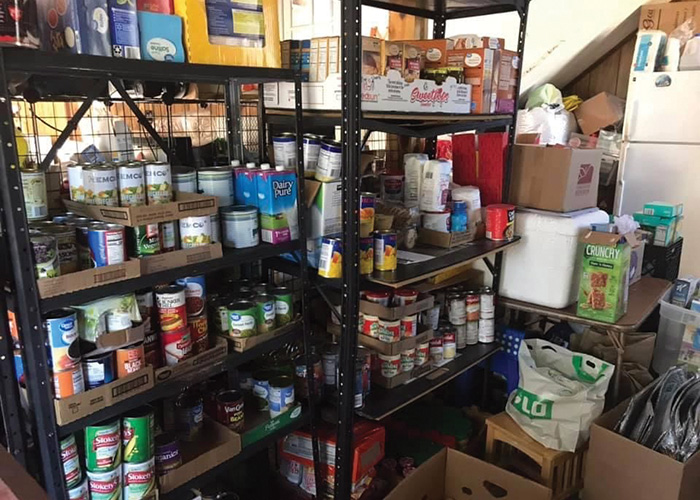
Stocks fill the author’s garage.
Courtesy of Kim Harmon
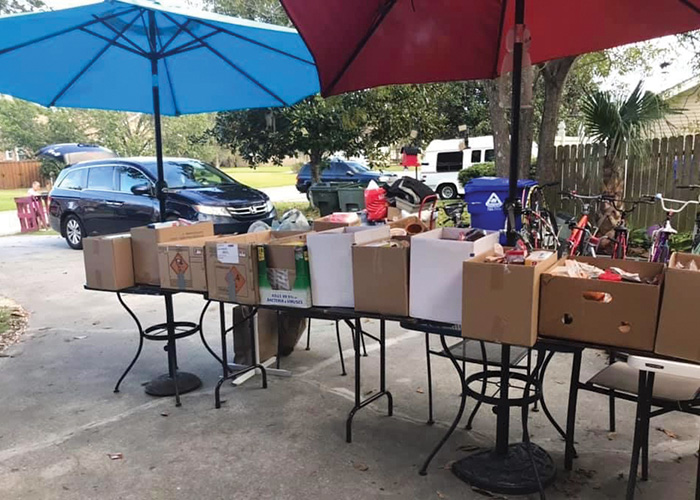
The food boxes are staged for packing and delivery on Saturday morning.
Courtesy of Kim Harmon
I started posting on Facebook and reaching out to nonprofits and the food banks. One co-founder at a local nonprofit, Tri-County Veterans Services Network, introduced me to the founder of Project Street Outreach, where I could get bread and food boxes. Later, I began picking up food donations from a medical clinic that had transitioned to a food bank with the onset of COVID-19.
I have received unexpected donations from grocery stores and from people in different neighborhoods. Some days I find food on my porch late in the evening. I never really know where help or food will come from or who will bring it, but it comes. One woman donated all the meat from her freezer when she became a vegan. Early on, a college friend who owns a local diner gave me dozens of local eggs because he had to shut down his restaurant due to COVID-19.
Sometime in the first few weeks my numbers jumped from six boxes to 13, and now I am at 19 boxes, all delivered to families and individuals living at the motel under various government assistance programs. The majority (14) are veterans, some with families, who depend on the joint U.S. Department of Housing and Urban Development–U.S. Department of Veteran Affairs supportive housing program for homeless vets. There are also a couple of disabled elderly men who are not vets and three women who rely on disability benefits. Since December, I have been bringing extra boxes of food to make sure I have enough for anyone who needs it. Each week volunteers and I bring food to 25 to 30 residents in this hotel. Their need for support has not diminished during the past year; rather, it has grown as COVID-19 persists and food shortages become more apparent.
My process starts on Monday and ends on Saturday, and then starts again. Every week I go to four different stores on Wednesday and Thursday (by now I know the cheapest place for most basic food items). Three volunteers help me make boxes on Friday. For the first six or seven weeks, I made the deliveries on my own on Saturday, but then ran out of space in my car and couldn’t handle the volume alone. Now three to five volunteers help with the deliveries each week.
March 6 marked the one-year anniversary of my first food delivery. But the project is about so much more. It is about realizing that when you make yourself available to the world, everything lines up. In week 11 the church stopped making cooked meals, and I was sad that I would not be able to take those; but by the following Monday I had received a Facebook message from a stranger asking if I would like soup. She put me in touch with a volunteer who happens to live five minutes away and had been preparing six gallons of soup weekly since COVID-19 started and asked if I could use it. I now deliver 30-40 quarts of soup weekly.
Another lovely neighbor bakes homemade pastries that she delivers to me every Friday. When I was starting to give up on finding fridge space, a friend who has helped me for months donated a full-size refrigerator for my garage, and that solved the problem.
I also started a Facebook fundraiser page to raise money for the project that helps pay for the food I buy weekly; it also allowed me to purchase Father’s Day gifts for the veterans. They never ask for anything, but they have so little. I spend an hour a week just talking with them, listening for what they may need—I hear things like they only have two spoons and one fork in their rooms, or they don’t own a folding chair, or do not have a toaster. These are little things that I can find to make their world a better place, things we think nothing of picking up at Target for $20.
So What?
These folks could probably get by without you, people say and ask me why I keep going each week. I explain that it is only partially about the food; it is also about these veterans (my kids call them “vitamins”) knowing that someone cares enough to show up each week. Many of them haven’t seen their children in more than 20 years. Their wives are deceased.
I do not go with an agenda. I simply go because one sweet gentleman said he was hungry, and it isn’t right. These men sacrificed for our country, and we owe them more respect than we give them. I cannot help them all, but for now Savannah, Leonard, Tadpole, Slim and I are forming a bond, and that matters. My kids will remember me helping these veterans. I will forever remember their stories and cherish the opportunity to have done something on a domestic tour that FSOs cannot do overseas.
I simply go because one sweet gentleman said he was hungry, and it isn’t right. These men sacrificed for our country, and we owe them more respect than we give them.
Why am I sharing this with you as fellow FSOs? Where’s the “so what?”—because that’s the important part, right? Here it is: At first I was floundering, trying to find people and a way to be productive here “at home” like I had been overseas, trying to feel like I was getting things done. Well, I have succeeded: I am helping Americans in America.
The project gives sustenance directly to folks who are in dire need. But they are not the only beneficiaries. Those who donate each week are able to give back to the community in a way that they could not otherwise. Many are older and at high risk for COVID-19, so can’t volunteer or work in food banks; but they love bringing by groceries and seeing pictures of the veterans. I am making connections with so many amazing people in my community through this project. Moreover, I am the first and only FSO most of these people will ever meet, so I’m able to educate people at a grassroots level about the work we do overseas. I am also doing something we cannot do as freely overseas, which is volunteering and helping others within my community without worrying about a public affairs angle or regional security concerns.
I never imagined that a random chat on Facebook while watching Netflix back home in America would change my life, but it has. I believe that if one is open to such moments, they can change the course of one’s life—perhaps briefly, or perhaps forever. This moment has already changed mine forever. Thanks to Mr. Henderson “Savannah” Sims telling me he was hungry, I am doing something that heals my heart, renews my faith in the generous spirit of Americans, and helps a piece of America in my small corner of South Carolina.
Read More...
- “The Foreign Service Responds to COVID-19,” by various authors, The Foreign Service Journal, July-August 2020
- “U.S. faces unparalleled challenge evacuating diplomats amid coronavirus crisis,” by Josh Lederman, NBC News, March 31, 2020
- “Bringing #AmericansHome: Diplomats on the Front Line of COVID-19,” by National Museum of American Diplomacy

